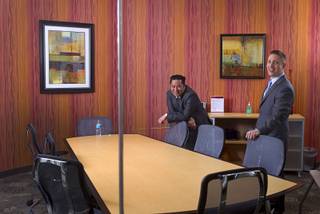Dave Rolley lives in Las Vegas but travels all over the world as vice president of Ampcontrol, an electrical engineering and manufacturing company based in Australia. Right now, he’s setting up six branches in the United States and overseeing the firm’s operations in South America.
Rolley needs an office wherever he goes, whether it’s Summerlin, Pittsburgh or Buenos Aires, so he uses executive suites — rental offices with flexible lease terms for owners of small to midsize businesses and executives who travel.
“I was constantly asking vendors if I could sit down in their office and plug in my laptop,” Rolley said. “This takes care of all that.”
Executive suites are short-term office sublets housed in larger office buildings. People can rent small cubicles or furnished corner offices for as much or as little time as they need. Common areas, such as conference and copy rooms, are shared, and services, such as billing and administration, can be ordered as needed.
Rolley rents space from Regus, which runs executive suites around the world, including seven locations in the valley. Access to the offices costs between $19 and $49 a month; no lease is required.
“This is an alternative to working from home,” said Leo Agustin, general manager of the Regus office at Tivoli Village. “We can give them a more professional image for their business.”
More than half a dozen companies advertise executive office rentals and virtual offices in the Las Vegas Valley. Virtual offices give people who work from home a business address, telephone answering and a mail routing service.
ViewPointe Executive Suites is among the oldest local companies in the industry, having been in business since 1998. It’s located in a 75-unit building on Eastern Avenue near the 215 Beltway.
Despite the longevity of the company, manager Chris Johnson said the idea of executive suites is new to many people.
“Not a lot of people are educated about it, but it’s a really neat concept,” Johnson said. “People get a big building with a Fortune 500 image, but you don’t have to pay for your own conference room or maintain your own restrooms.”
There’s no need to sign a lengthy lease, and operators provide furniture, Internet, printing services, cleaning — even coffee. Executive tenants can reserve conference rooms by the hour or day.
“It’s a smarter, more efficient way of doing business,” said Tom Buntic, who owns Sandhill Executive Suites and Eastern Executive Suites. “You literally go, plug in a computer, and you’re in business.”
The Regus office at Tivoli Village, where Rolley and almost 60 other executives work, has a desk with two receptionists in a contemporary lobby. Off to one side is a kitchen with coffee, tea and snacks. An industrial printer sits in the corner.
But here, there’s no sign listing tenants’ names. That’s by design. It could be anyone’s office.
“At the end of the day, we’re just a management company,” said Michael Hatcher, general manager of a Regus office on Howard Hughes Parkway. “We like to say that this is their office. It’s not our office. We just manage it for them.”
Executive suites also provide a legal address for businesses.
“The state may require them to register with an address in a commercially zoned location,” Agustin said. “We can give them that. People might not want to give out their home address.”
Even though business owners have to pay a monthly fee for access to the suites, many say the offices help them save money.
When David Wedemeyer and William O’Grady started a law firm last year, they priced out what it would cost to set up an office. The real estate attorneys quickly discovered the expense was great. They would have to sign a long-term lease, furnish the space, set up phones, get utilities and hire administrative staff.
Then, they looked at the Regus offices.
“It’s more expensive per square foot, but they take care of a lot of things that will save us money over the long term,” Wedemeyer said. “You don’t have employees, so you’re not paying ADP (payroll services) and worker’s comp. The administrative staff works for Regus, so they pay all that. For us, it’s all about keeping the overhead low and passing that savings along to our clients.”
Executive suites typically charge a flat fee for office space.
Regis, for example, charges $19 a month for access to a small desk and laptop plug-in at any of its valley locations. For $49, customers can use any of the company’s offices worldwide.
Extras cost more.
Executives who need an actual office can rent one for between $450 and $900 a month. A phone and Internet package costs $199 a month. Meeting rooms rent for $54 to $108 an hour.
Executives also can pay for dedicated bandwidth so they don’t have to share an Internet connection. Those prices vary.
“If you don’t need it, you don’t pay for it,” Agustin said. “We look at your budget.”
In the lobby, two administrative assistants sit in front of computers. When the phone rings, their computer screens prompt them with a personalized greeting for the business the caller is trying to reach. That gives the impression of a larger office.
For an additional fee, Regus employees also write out invoices and keep financial records.
“They run people’s offices so our clients can run their businesses,” Agustin said.
Real estate agent Tom Buntic learned about the demand for executive suites when he bought an empty office complex last year at East Sunset and South Sandhill roads. He remodeled it to include space for 24 executive suites. They all rented in three months.
This year, Buntic bought an abandoned office building with 44 suites at South Eastern and East Wigwam avenues. So far, he has leased 10 of them.
Buntic has a different business model than Regus. He charges a flat fee for office space: $300 for 105 square feet, $600 for 180 square feet. Each office comes with an Internet hookup and access to a copy machine, conference room, break room and cleaning services. There are no long-term leases.
“I found that by charging just a flat fee, I can keep my prices competitive,” Buntic said.
Buntic doesn’t offer telephone or secretarial services because no one has asked for them, he said.
“I found a lot of people coming to me are really more mobile,” Buntic said. “Very few people have landline phones. We can save costs that way.
“Technology has made a lot of things obsolete, like video conferencing. Every computer has a camera on it. I have a fax machine available, but nobody uses it.”
Buntic’s clients include real estate appraisers, software developers, stock traders, insurance agents, financial planners, salespeople, an architect and a psychiatrist.
“Basically, any small- to medium-size business that needs an office can use this,” he said. “It doesn’t work if you’re a supplier who needs a ton of storage space. But it makes sense even for larger companies that are struggling. They may be spending $2,000 or $3,000 a month. They can rent several executive suite offices and still be in business, have fixed costs and save money.”
ViewPointe combines the two models.
Offices rent for between $600 and $1,000 a month and include a phone, five hours of conference room use and signs. Secretarial services, additional phones lines and covered parking cost extra.
Johnson said occupancy is fluid. Four offices currently are available in the 75-office suite.
“Executive suites are geared toward being flexible and not having long-term leases,” Johnson said. “If someone is outgrowing their space and needs to move into a bigger office, we make it so they can terminate their lease quickly. Sometimes, I’ll go six months without an opening. Other times, I’ll have two or three in one month.”
The kinds of businesses that are drawn to executive suites also change consistently.
“During the recession, we saw some businesses downsizing, and they came to use us,” Johnson said. “Now, the economy is growing again, they’re growing, and they need bigger offices. When the economy is good, we see more startups. That’s just how small business works.”


